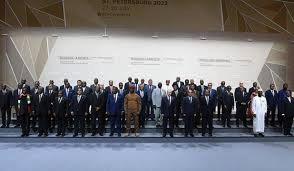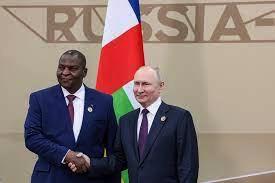 A recent conference involving leaders of African nations in St. Petersburg evidenced discontent with disruption of grain supplies from Ukraine rather than engendering goodwill for the Russian Federation.
A recent conference involving leaders of African nations in St. Petersburg evidenced discontent with disruption of grain supplies from Ukraine rather than engendering goodwill for the Russian Federation.
The president of the Congo Republic called for a restoration of peace and was supported by the president of Egypt who called for restoration of the Black Sea Grain Initiative. The leaders of African nations have crafted a peace proposal that will inevitably be unacceptable to both belligerents
 President Vladimir Putin maintains that rising prices of grain was a consequence of “western policy mistakes that long predated the Ukraine war”. This assertion is contradicted by documented increases in the prices of commodities following the February 2022 invasion of Ukraine. He pledged 25,000 to 50,000 tons of grain as a donation to six nations in need and offered to cancel debt that could not be repaid in any event.
President Vladimir Putin maintains that rising prices of grain was a consequence of “western policy mistakes that long predated the Ukraine war”. This assertion is contradicted by documented increases in the prices of commodities following the February 2022 invasion of Ukraine. He pledged 25,000 to 50,000 tons of grain as a donation to six nations in need and offered to cancel debt that could not be repaid in any event.
Putin maintained that Russia withdrew from the Black Sea Grain Initiative because “It was not getting grain to the poorest countries and the West was not keeping its side of the bargain.” Russia used the BSGI and world hunger as leverage in attempting to force E. U. nations and the U. S. to withdraw or ease sanctions imposed on Russia.
Putin has resisted entreaties by African nations to reach an accord with Ukraine and it is apparent that the St. Petersburg meeting failed to strengthen ties with Africa and to establish a more benevolent image of the Russian Federation.
It is apparent that Russia intends to annex the four Ukrainian regions in the east that were occupied 17 months ago and representing close to 20 percent of Ukrainian territory over and above Crimea that was annexed in 2014. Understandably the Ukraine is rejecting a cease-fire or peace agreement that would cede the four occupied regions and Crimea. The nation is resisting a cease-fire that would enable the Russian Federation to re-arm. Even if the GSBI were to be renewed with immediate effect, the damage caused by deliberate destruction of grain storage and port infrastructure would continue to restrict supply of grain to African nations.